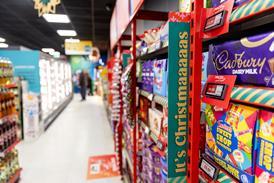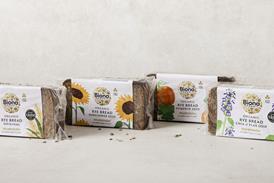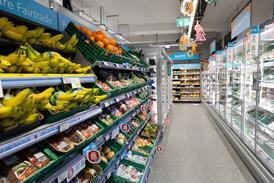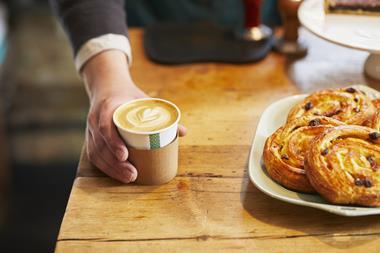It’s incredible how the humble loaf of bread continues to make the headlines. At present it’s being vilified for its salt content - apparently, two slices of wholemeal bread contain 1g of salt and two slices of white, 0.7g. But UK consumers love their daily bread; you only have to look at the space the major mults give over to in-store bakeries and bakery aisles to realise this. And many convenience retailers have embraced bread wholeheartedly, investing time and money to make it a big success in their stores.
Bread features in five of Kantar Worldpanel’s Top 10 Great British Meals (eaten at home): sandwiches, beans on toast, toasted sandwiches, cheese on toast and toast. But it can often be an accompaniment to four of the other meals in the top 10: soup (with bread or a roll); spaghetti Bolognese and pasta (with garlic bread or ciabatta) and curry (what about the naan?). In fact the only meal in the top 10 which wouldn’t include bread is a Sunday roast, apart from when it’s turkey - pass the bread sauce!
As such, it’s important that convenience store retailers offer a good selection to ensure they’re cashing in on the vast range of usage opportunities throughout the day. According to Kantar Worldpanel data, the average person consumes bread six times a week and within a year there are a whopping 17.7bn in-home bread occasions.
As a result, the pre-packed bread category is worth £1.7bn in the UK (Kantar data). And while health is supposedly uppermost in consumers’ minds, it is white bread that takes the majority of sales, accounting for more than half of the sector.
But the health message may well be getting through as white bread sales are in slight decline (down 2.8%) while sales of bread with healthier credentials are growing - half and half loaf sales are increasing by 6.5%, for example.
Julia Perry, trade and shopper marketing manager at Allied Bakeries, says: “The bakery category has great potential to maximise sales for retailers, especially with sectors such as Breads of the World in growth, making it vital for retailers to keep up with the evolving trends in the sector.”
Megan Harrison, portfolio and brand director at Warburtons, adds that consumers are also demanding more variety and excitement from their meals, particularly at lunchtime. “This has resulted in growth within the convenience sector of bakery snack segments, including sandwich alternatives, with products such as thins, wraps and pittas becoming one of the fastest growing areas in bakery.”
For some retailers, getting in bed with your local baker could do wonders for your bread sales. A great example is Stephen Smith, who with his wife Karen runs Tanerdy Garage in Carmarthen. He uses his local baker, Hafod, for bread.
The versatility of bread means it can be consumed at breakfast, lunch, or dinner, and even in between. This means shopper missions are plentiful.
For retailers looking to link the bread and bakery fixture with other categories, they need to think of the mission behind the shop. Julia Perry, Kingsmill channels shopper and trade marketing manager, explains: “In order to capitalise on ‘meal mission’ seekers, retailers need to consider cross-merchandising.”
Kingsmill recently linked up with Cathedral City, launching a set of in-store cross- merchandising tools to help independent retailers maximise basket spend and drive the lunchtime meal occasion. The idea was that keeping bread next to, or opposite, the shelf with Cheddar would encourage shoppers to buy them together.
Kingsmill followed this with a partnership with Heinz Beanz to highlight the beans-on-toast meal occasion. Parminder Walia, convenience development manager at Heinz, adds: “This collaboration is the perfect union of grocery brands, bringing the meal solution front of mind for shoppers.”
“Hafod has a very good name locally. We’ve used a number of suppliers over the years, but the Hafod bread was what customers demanded; many have a weekly bread order and we rarely have any wastage.”
For this type of joint venture to work, Stephen says the product must be of a comparable quality to competitors’. “Hafod’s is a fresh-baked product, as opposed to a ‘plant’ bread, and is widely acknowledged as being excellent.”
Stephen has four shelves for bread in his 1,000sq ft store, which are restocked during the day, plus there’s one shelf for buns, rolls and similar items. Hafod bakery products also feature in the food-to-go area as Stephen uses them to make the sandwiches, rolls and baguettes he sells. These generate an impressive turnover of £100,000 a year.
“We get a daily delivery at 5.30am, except on Sundays. The products sell on their reputation, and we ensure a reliable and fresh supply at a competitive price.”
Stephen says attractive packaging and labels are important, too, to convince the buyer of quality. “The display should be tidy, clean and clear of mess. And it has to be priced to sell, as wastage is expensive.”
Wastage was a big problem for Kerry Drew, manager of the Spar store in Aspley, Nottingham. “We used to have Kingsmill and Warburtons, but the store couldn’t cope with the two lines. I had no sale or return option and used to fill lots of black bags each day with unsold stock,” she says.
“In 2012, my regional manager suggested I try Roberts and we started with just four to five loaves a day - medium- and thick sliced white - alongside the Kingsmill. Within a few months, I removed Kingsmill and now stock only Roberts. I’m now selling £400-£500 of their bread a week.
Pukka Tukka
Sometimes the perception of frozen food is that it’s inferior in quality when compared to chilled. However, Pukka Pies says that any frozen product it launches goes through the same rigorous quality care control channel with the same pastry and full fillings.
Its best-sellers in convenience are its new, frozen baked handy twin-pack pies and its 3.5 minute microwave short crust pies.
“Both are great products,” says Pukka Pies brand manager Sally Voss. “And they both have the same quality pastry and filling as our chilled pies.”
The handy twin-packs come in two flavours - all steak and chicken & veg - as does the 3.5 minute microwave pies - in all steak and chicken.
Voss says Pukka Pies chilled single range is also stocked by c-stores.
The company makes more than 60 million pies and pasties every year. All meat is hand-prepared by a team of skilled butchers at its site in Leicestershire and the entire range contains no artificial preservatives or flavourings and is free from hydrogenated fats.
“The deliveries come six days a week, so the bread is always fresh, and I have a great relationship with the delivery driver. If one day sales haven’t gone as well, then the next we will just take a little less from him. We can anticipate busy days, too, and get more when we need it.
“We carry the full range: medium, thick and mega thick white; wholemeal medium; thick, morning rolls; and the speciality range. The Tiger bread is the most popular of the speciality range, although I love the malted cob.”
Kerry says anything that’s pricemarked sells well. “Cost is important, and even when the bread isn’t on promotion I keep it to £1.25 for a loaf and 83p for a half loaf. I don’t want stock sitting on the shelf.”
Wherever you source your bread, it helps to have a good relationship with the supplier. Sandra Taylor-Meade, manager of Budgens of Holt, Norfolk, says she has a really good relationship with her Warburtons rep. “We’re a big store so a big customer, which means we get monthly visits. And we often do in-store tastings; our most recent was of Warburtons thins and they were really popular.”
As well as Warburtons, the store stocks Kingsmill, lines from local baker Graves, and has an in-store bakery supplied by Country Choice.
“Warburtons is a very strong seller,” says Sandra. “We usually have three or four lines on sale for £1 - customers like that. Warburtons supplies us with bins so we can do a big off-shelf display. They give us sale or return, but we don’t often need it.”
From Graves, the store stocks items such as packs of four Hovis rolls, rye bread, gluten-free bread, ciabatta and cream cakes.
Sandra says the shop is selling more gluten-free products than ever, so much so that it now has a 1m dedicated gluten-free section.
Put pancakes on the menu
Warburtons’ latest marketing activity focuses on the breakfast sector with a £3.9m investment designed to inspire families to discover new flavour combinations and usage occasions for pancakes. The brand’s latest flavours include cookie dough and chocolate chip cookie. Meanwhile, in Scotland Warburtons is promoting its crumpets in a bid to encourage more people to try them toasted.
Hovis works on shoppers’ perceptions
To draw more adults back into the white bread category, Hovis has been investing in consumer education. The activity aims to help dispel the myths surrounding white bread and focusing on the role bread plays as part of a balanced lifestyle.
Ginsters bakes pies for c-stores
Ginsters has launched new pies into Tesco, and these are available to c-store retailers via its van sales. The range includes individual pies (200g) in chicken & mushroom, steak & kidney, steak, and steak & onion. There is also a rotating special-edition of either peppered steak, creamy chicken, chilli beef or steak & ale. Joining these are two 500g family pies: steak & onion and chicken & mushroom.
Earning its stripes
Country Choice says growing demand for Tiger products has prompted it to add a tiger bloomer, tiger roll and tiger baguettes, as well as a tiger bagel. And there are more tiger varieties in the pipeline as shoppers look for something different.
Source
Tracy West

























No comments yet